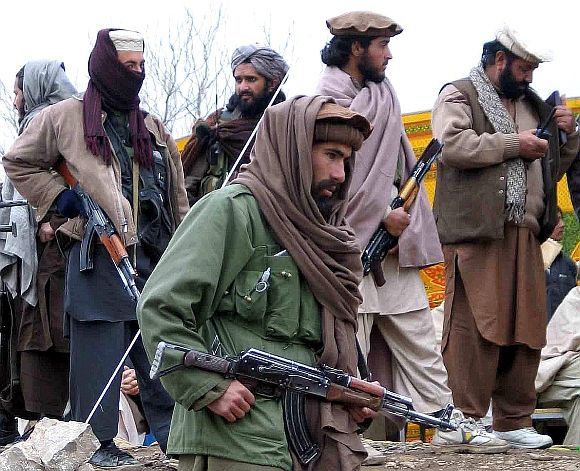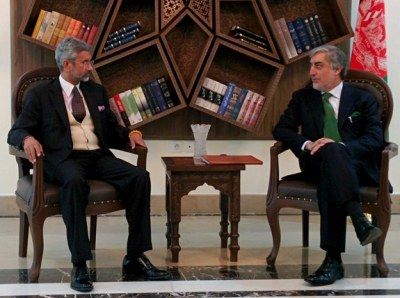'Some Pakistani generals are saying -- a little more so now than before -- that the biggest threat to Pakistan is not external -- not India -- but internal.'
'The proof of that will be their change of policies and that is going to be the challenge,' Rakesh Sood, one of India's most distinguished diplomats, tells Aziz Haniffa/Rediff.com in Washington, DC.

Afghanistan's growing political and security stability effectively negates Pakistan's efforts to exploit the situation in that country, former Indian ambassador to Afghanistan Rakesh Sood told Rediff.com in Washington, DC.
Islamabad's strategic depth concept vis-a-vis New Delhi is all but obsolete, Sood, one of the most knowledgeable observers on Afghanistan, added.
It may have finally dawned on the Pakistani military and the directorate of Inter Services Intelligence -- the ISI -- that Islamabad's existential threat is not India, but what lurks within Pakistan, Sood felt.
"Pakistan has looked upon Afghanistan as part of its strategic depth, but now, particularly after the Peshawar school attacks last year, the Pakistan army chief has been saying that the country needs a course correction," Sood said.
"He (General Raheel Sharif) has said that henceforth, there is no good terrorist or bad terrorist. Earlier, Pakistan, when it started its military operations, would target those terrorist groups who were attacking the Pakistani army," Sood added. "But those terrorist groups who were only active vis-a-vis India, they would leave them aside."
"Now, they have said, 'No, we are not going to make any such distinctions,'" Sood noted, and predicted, "If this change is serious and if they are able to deliver on this change, that would probably indicate that they have changed that view in terms of India being the existential threat mindset."
There has, Sood felt, been virtually an echo chamber of "some Pakistani generals saying -- a little more so now than before -- that the biggest threat to Pakistan is not external -- not India -- but internal."
However, the ambassador acknowledged, "The proof of that actually will be their change of policies and that is going to be the challenge."
"Insofar as the influence of the Taliban in Afghanistan -- that's the Afghan Taliban -- this reconciliation, if it takes place in the framework that President Ashraf Ghani has said within the Afghan constitution, then it it is a positive development," Sood said, "because it heals the conflict."
But he warned, "If it is with a view of bringing back the Taliban and the regime of the Sharia and all the rest of it, as it existed in the mid-1990s -- then obviously it's not going to work because the Afghanistan of today is not the same Afghanistan that existed in the 1990s, when the Taliban first came in."
"At that time," Sood pointed out, "it was an Afghanistan that had already been suffering through a lot of civil war and things like that."
"In the last 15 years, under (then) president (Hamid) Karzai, we have seen democratic institutions flourish in Afghanistan, there is an extremely active media, cell phone technology exists all through the country, people are in communication with each other, and children go to school, women work."
"From less than one lakh (100,000) students who were going to school, today, you have something like 80 lakhs (8 million) going to school, and out of that, one-third are girls," Sood said.
"So all this has changed Afghanistan and it is very unlikely that the Afghan population will agree to go back to the kind of Sharia and that kind of system that existed during the Taliban period," he added.

"There is a new enthusiasm in Afghanistan and an attraction to democracy, to economic development, economic betterment, to education, to open society and media and so on," Sood, one of India's most cerebral and respected diplomats, felt.
"If Pakistan tries to exploit such a situation," he warned, "it would backfire very strongly (on Islamabad)."
The diplomat acknowledged that it is imperative that "the political transition that is taking place (in Afghanistan) remains a very stable transition in the sense that a national unity government remains stable and can move things forward and people feel reassured."
"Otherwise, the risk is of ethnic polarisation and things like that," he said. "The second issue is the capability of the Afghan National Security Force to deal with rising incidents of violence in the country."
Sood explained that the Afghan National Security Force "was created from scratch and so is not an army that has a long tradition or has been in existence for a while. So the question is what are its capabilities, what types of equipment does it have and how does it deal with these issues."
In this regard, continued American defence and security largesse in addition to massive doses of economic aid to Afghanistan is essential, Sood said, and argued that it was only the US and not a country like India that could provide this kind of support that is imperative to maintain stability in Afghanistan.
"American financial contributions are significant compared to any other country. India has committed a certain amount of financial assistance," Sood said, "but this is in the area of economic development. We do not have any major contribution in the field of security."
REDIFF RECOMMENDS
- Two Pak generals, one Afghan endgame
- Pakistan is nurse, guide, guardian of Afghan peace
- Chasing the Chimera of Afghan peace
Images: Top: Members of the Taliban in Afghanistan. Photograph: Reuters
Bottom: Foreign Secretary Dr Subrahmanyam Jaishankar, left, with Dr Abdullah Abdullah, Afghanistan's CEO.










 © 2025
© 2025